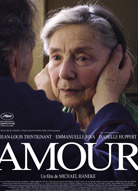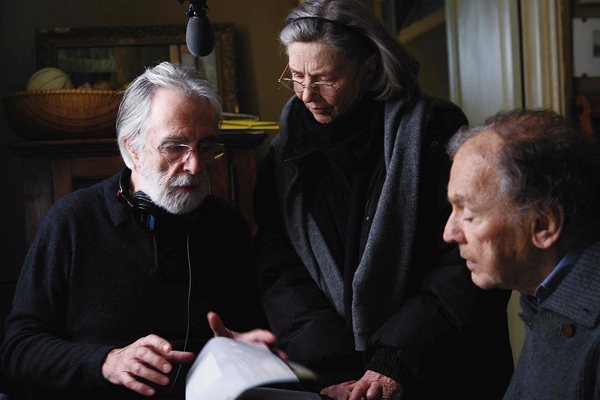NYFF: "Amour" & "No" Are Worthy Oscar Contenders
 Saturday, October 13, 2012 at 4:14PM
Saturday, October 13, 2012 at 4:14PM 
The Oscar race for Best Foreign Language Film is particularly exciting this year. We have more contenders than ever (71!) and so many strong films that the Academy's always controversial foreign language branch will undoubtedly piss various contingencies off when they announce the finalist list and then the nominees. They could lessen the size of the outcry each year if only their finalist list were 12 films long. It's so strange that they make it small enough (9 films) that those films which miss the nomination are in the minority and, thus, look particularly snubbed... numerically speaking. I've already raved about the Pinoy movie "Bwakaw", and here are two other worthy candidates for this annual honor. Don't miss them if you get a chance to see them
AMOUR (Austria)
“Ladies and Gentlemen, people die. That’s all you need to know.” This line, a recurring catchphrase from aging chanteuse Kiki (Justin Bond) in the now departed Kiki & Herb act, used to make me howl with laughter. It was a perfect punchline, soaked as it was in booze and tragicomic matter-of-factness. People do die. Death is a fact of life but we spend so much time denying it that it often feels completely abstract, an imagined fate rather than an eventual one. But as Anne (Emmanuelle Riva), the elderly woman at the heart of Michael Haneke’s new film reminds us:
Imagination and reality have little in common.”
At first Haneke keeps his customary distance. Were it not for early publicity or the disturbing pre-title sequence that shows us a woman's decomposing body surrounded by flowers, we wouldn't even know who the principle characters were during the post-title opening shot, a crowd watching a piano recital. As in the finale of Haneke's best film (Caché) the director doesn't help you decide where to look; it's your job to find the narrative. But one of the strongest directorial impulses in Amour is Haneke's barely perceptible but undeniably tightening focus on the couple. Each scene seems to bring us closer to Anne and Georges (Jean-Louis Trigninant), a happy well-off couple in their eighties who enjoy literature, cultural events, and visits from their daughter (Isabelle Huppert) and Anne's former student (the pianist Alexandre Tharaud who appears to be playing himself). The first close-ups of note, an utterly captivating shot/reverse shot of the couple as Anne all but vanishes from a conversation in progress, is the bomb dropping...
 Michael Haneke with his actors on the set of "Amour"
Michael Haneke with his actors on the set of "Amour"
As Anne's health rapidly worsens, Georges turns increasingly from doting husband to rattled caretaker, patient spouse, memory bank, and thoughtful storyteller. Though Amour has often been described as an unusually warm Michael Haneke picture, it's as chilling as his most violent pictures. The warmth is in the humanity and love in the marriage brought to life by two classic (and Oscar-worthy) French actors. But this is no simple portrait of marital happiness -- Anne's mood also disintegrates and Georges is not superhero -- but a detailed portrait of life-long love and its limitations in the face of mortality. The couple's relationship is increasingly strained. Anne tells Georges.
You’re a monster but sometimes very kind.”
The same could well by said of Michael Haneke, a brutal filmmaker who nevertheless takes a kind of mercy on both Georges and Anne as they exit the film. A-
 NO (Chile)
NO (Chile)
Gael García Bernal is, to The Film Experience at least, the unofficial mascot of Oscar's Best Foreign Language Film category. He has frequently starred in foreign submissions for multiple countries (Mexico, Spain, Chile), some nominated, some not. Through them all he's never been less than an accomplished compelling movie star. His latest movie, No, is about the Chilean referendum that finally brought an end to Pinochet's dictatorship. In 1988, with international pressure mounting to legitimize his reign, Pinochet put his own unelected presidency up for a simple "yes"/"no" vote. Dictators don't tend to have to worry about the voice of the people since they control the voice by controlling the flow of information and exiling, executing, and otherwise silencing the opposition.
Gael plays René Saveedra, the lead ad-man behind the "No" campaign which is alloted 15 minutes of television a day to make the case against Pinochet's reign. Saveedra's reasons to risk his career, life, and family to overthrow a dictator are only rarely alluded to and the actor, relying principally on those evocative eyes, internalizes all of it. It's a remarkably self-effacing performance and hugely effective, too, for Saveedra is not truly the subject of No but the vessel.
This is the third film in an unofficial trilogy on the subject of Pinochet-era Chile by writer/director Pablo Larraín. The first, Tony Manero, was also an Oscar submission but its nihilistic misanthropy didn't thrill me and didn't remotely prepare me for the thematic depth, deadpan humor, and indefatigable spirit of this terrific film which is as much about the power of television and the myth-making of advertising as it is about politics.
A huge portion of the film is archival footage (like this hilariously 80s "No" commercial, the real thing from 1988) and it blends seamlessly with the VHS ready look the filmmaking team has perfected for the new footage. Purposely "ugly" movies -- even when that ugliness is a technical achievement -- aren't generally Oscar-friendly (they favor craft that aims for beauty) but hopefully the Academy's foreign language committee will see No for what it's worth and vote Yes. I'm still humming its happy jingles hours later. A-



Reader Comments (13)
I missed No but saw Amour at NYFF. I've never liked Haneke before. Started and didn't finish both Cache and The White Balloon. But love Amour; so maybe it is his most accessible movie. I love actors and acting and this two performances for the ages. There are so many humanly recognizable moments that had jolts go through my heart and body. This is art in the best sense moving, recognizable and a reflection of life.
It appears Riva gives the best female performance of the year. Too bad the Academy will give the Oscar to the young and hot "it" girl - Jennifer Lawerence.
It'll be another case of Julie Christie vs. Marion. But yeah I doubt anyone will give a better performance this year. Riva was just astonishing and the Academy should make it up to Haneke too by finally giving him Best Foreign Language Film.
I'm going to see "No" on Monday at LFF. I've very much looking forward to it as I've heard such good things. I'm loving the vast spread in the Foreign Language Film... I just saw Australia's "Lore" and Switzerland's "Sister", I hope they both do well.
I am originally from Peru so I'm dying to see my neighbors' 'No'. I've only heard great things about it. Any word whether it will be released in the US anytime soon?
@ Murtada: "The White Balloon", hahaha
I hate to sound uncultured, but I found Amour rather dull. There were some powerful moments, sure, but they felt drowned in a sea of long takes.
I did love No, however. For a film about the end of a dictatorship, I had a blast. As far as the FL Oscar goes, it doesn't seem as self-serious as most of the films that get nominated so I'm worried it will get left out.
Personally, I'm hoping this year's FL winner is still waiting for me.
I loved Amour. I think the portrayal of the decaying Riva is astonishingly precise, tender and not at all voyeuristic. During my studies I'd been working as a nurse and I've never seen a film that comes as close as Hanekes to the reality of after-stroke life. The scene where Georges is taught how to diaper his wife, while we see her face that gives away her humility, yet at the same time showing how tenderly he tries avoiding it being too embarassing for her - that was probably one of the best scenes I've seen this year.
I haven't seen better work this far than Mrs Rivas. She'd really deserve Oscar's attention.
She was already stunning in "Hiroshima, mon amour", nearly sixty years ago.
Gael Garcia Bernal will get an oscar nom next year for "The Dallas Buyers Club". I can feel it
I also gave the same grade to "Amour", but I think the actors deserve an A+. I have to say even though Isabelle Huppert has a small role, she plays it equally powerful: someone who's angry and confused because her parents are shutting her off. She also has to deal with her own problematic marriage as well. That last scene is so powerful it makes enduring the movie worthwhile. I don't think Haneke brought anything new (e.g. The scenes with Huppert staring out the luminous curtain/window are directly out from "The Piano Teacher"), and if you don't like Haneke before, it won't convert you otherwise. This is definitely going to be in my top 5 for certain this year. Can't wait to see "No" on Wednesday!
"No" was just fabulous, wasn't it? Saw it by accident when I went into the wrong sessions at MIFF (I was meant to see the Mads Mikkelson drama, "The Hunt") and was totally surprised. Especially since I'd walked out of Larrain's last film, "Post Mortem". The film style, made with real retro cameras from the period, is perfect and makes the insertion of real footage seamless. Fantastic.
"Amour"... I'm cooler on this one, although the performances are indeed incredible.
Lawrence should go in supporting where she belongs (and win) and then Riva could win too.
: )
Did you see Clandestine Childhood ? I saw it at the Biarritz International Festival some weeks ago and it looks like an Oscar winner (is a Foreign contender from Argentina), it will be released in USA this november distribuited by Film Movement, you can see the trailer here: http://www.youtube.com/watch?v=trlwZnOp9zI